
The push is on for GP practices to adopt digital services; health secretary Matt Hancock is an advocate and is leading the march; however, there is division over how best to integrate them in practice. The team at Doctorlink share some of differing views on how the NHS should implement new technology
The general practice community is largely divided over the best way to adopt technology in practices; while it’s viewed as a means of delivering new levels of efficiency and enhancing patient care. However, to do so, the right technology needs to used and implemented in the right way. But what does this look like?
According to a recent survey, opinion in the general practice community is largely divided over the best way to adopt technology in practices. In a survey of 1,003 GPs, 39% said that every practice should use the same NHS digital triaging service. But a similar number of GPs (34%) held contrasting views, believing that each practice should be able to choose which service works best for them. A further three per cent believe that all practices should use the same non-NHS digital triaging service.
Success hangs in the balance
While Matt Hancock is making the digitalisation of the NHS one of his top priorities, the majority of GPs remain cautious about the broad impact of digital services. Yet 60% of respondents say their impact has been exaggerated; a figure that rises to 70% among the country’s longest-serving GPs.
In addition, GPs are not convinced by the capability of the NHS App, due to launch in December, to help reduce demand on primary care services. In fact, 61% expect that the NHS app, which entered beta testing last week, is likely to actually increase the number of patients wanting to see a GP in person.
Within the GP community there exists significant doubt over the NHS’s ability to effectively implement new digital services, with the vast majority (83%) not confident in its capability to do so. Only 14% were confident that the NHS App will launch by the end of the year. “It’s clear that the views of GPs haven’t always been properly considered when it comes to the integration of digital services into the NHS,” said Andrew Gardner, CEO of Doctorlink. “We acknowledge this and make sure that we develop our services in partnership with, and in service of, the GP community. As an industry, we must do more to address GPs valid questions and prove that digital services can help them deliver better outcomes for patients.”
What is the importance of digital services in GP practices?
The survey found that doctors are also split over the fundamental question of whether digital services are important in improving the quality of primary care, with 52% saying it’s important and 40% thinking that it isn’t. When asked, ‘What is the most significant problem that technology must solve?’ GPs most often named face-to-face appointments as their top priority (33%).
This is felt even more acutely in the country’s biggest practices – at 37% among GPs with over 10,000 patients listed in their practice.
A matter of improvement
“Most GPs believe that these services will improve the quality of primary care offered by the NHS, but many of us have important questions when it comes to their implementation,” said Dr Bruce Websdale, a South West London GP. “These findings reinforce the importance of close collaboration between the people developing these services and the people using them on the frontline of the NHS.”
GPs are strongly united when it comes to the role of clinicians in the design of digital services. Ninety-four per cent say clinician involvement is important to the development of digital services to support the delivery of primary care. There is also very strong awareness of digital GP and triaging services among the majority of GPs; 81% are aware of the major companies and products that are currently available for delivering digital GP services to the NHS (of those included in the survey).
Digital is our present and certainly our future – what’s important is that the GPs and practice staff play a fundamental role in shaping how the technology is integrated.
Don’t forget to follow us on Twitter, or connect with us on LinkedIn!

Be the first to comment